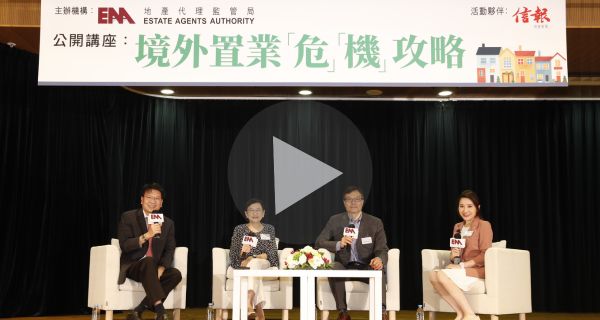
Combatting money laundering requires effort from both estate agents and property purchasers/vendors
Combatting money laundering requires effort from both estate agents and property purchasers/vendors
2018-04-20As a major international financial centre in Asia, Hong Kong attaches great importance to combatting money laundering and terrorist financing to safeguard the integrity of our financial system. An effective anti-money laundering and counter-terrorist financing regime is hence in place and effort from everyone including estate agents, property purchasers and vendors is required for its implementation.
The Legislative Council passed the Anti-Money Laundering and Counter-Terrorist Financing (Financial Institutions) (Amendment) Ordinance 2018 specifying the requirements on customer due diligence and record-keeping in specified transactions conducted by designated non-financial businesses and professions (including estate agents) in January 2018. In order to provide estate agents and the management of estate agency companies with detailed guidelines to comply with the Ordinance, the Estate Agents Authority (“EAA”) has issued a new practice circular (No. 18-01(CR)) which became effective on 1 March 2018.
I would like to draw your attention to this subject because the above Ordinance and our new practice circular require estate agents to obtain more information from clients. This may cause inconvenience to both clients and estate agents. However, everyone participating in the property transaction process (not only estate agents and property purchasers/vendors but also law firms and banks) should do their best to cooperate so as to combat money-laundering and terrorist financing in Hong Kong.
According to the guidelines in the new practice circular, estate agents must take all reasonable steps to mitigate the risk of money-laundering and terrorist financing when handling the sale and purchase of properties, as well as to ensure that appropriate preventive measures are in place. They should establish and implement various policies and measures including: risk assessment, customer due diligence, record-keeping and reporting suspicious transactions, etc. to fulfill their responsibilities.
Amongst the above, carrying out customer due diligence and record-keeping are most important. Under the Ordinance and the new guidelines, estate agents are required to identity and verify the customer’s identity (whether the customer is a purchaser or vendor). Therefore, they need to collect personal information from the customer (for example, if the customer carries out a transaction as an individual, estate agents must obtain the customer’s Hong Kong Identity Card or travel document). If the customer is a company/corporation, whether the company/corporation is incorporated in/outside Hong Kong, estate agents must obtain the customer’s company information such as certificate of incorporation or the certified copy of similar documents. Estate agents must not establish a business relationship and must terminate the business relationship with the customer if they fail to complete the customer due diligence process.
Estate agents are also required to keep the relevant records throughout the continuance of the business relationship with the customer and for at least five years beginning on the date on which the business relationship ends. It means that estate agents are required to obtain a copy of the customer’s identity document (Hong Kong Identity Card or travel document if the customer is an individual) for record-keeping.
I would like to reassure property purchasers/vendors that the EAA has guidelines for estate agents to follow on the protection of clients’ personal data. They can only collect clients’ personal data for the purpose of carrying out estate agency work and cannot use such personal data for any other purpose without their clients’ consent. They must also take all practicable steps to safeguard the documents containing personal data from loss or unauthorised access by third parties.
Once again, I hope that both estate agents and property purchasers/vendors appreciate that combatting money laundering and terrorist financing requires everyone’s efforts.
Ruby Hon
Chief Executive Officer
Estate Agents Authority


